More languages
More actions
This article covers a current event. The information presented may become rapidly obsolete as new developments take place. |
| Russian Special Military Operation | |||||||
|---|---|---|---|---|---|---|---|
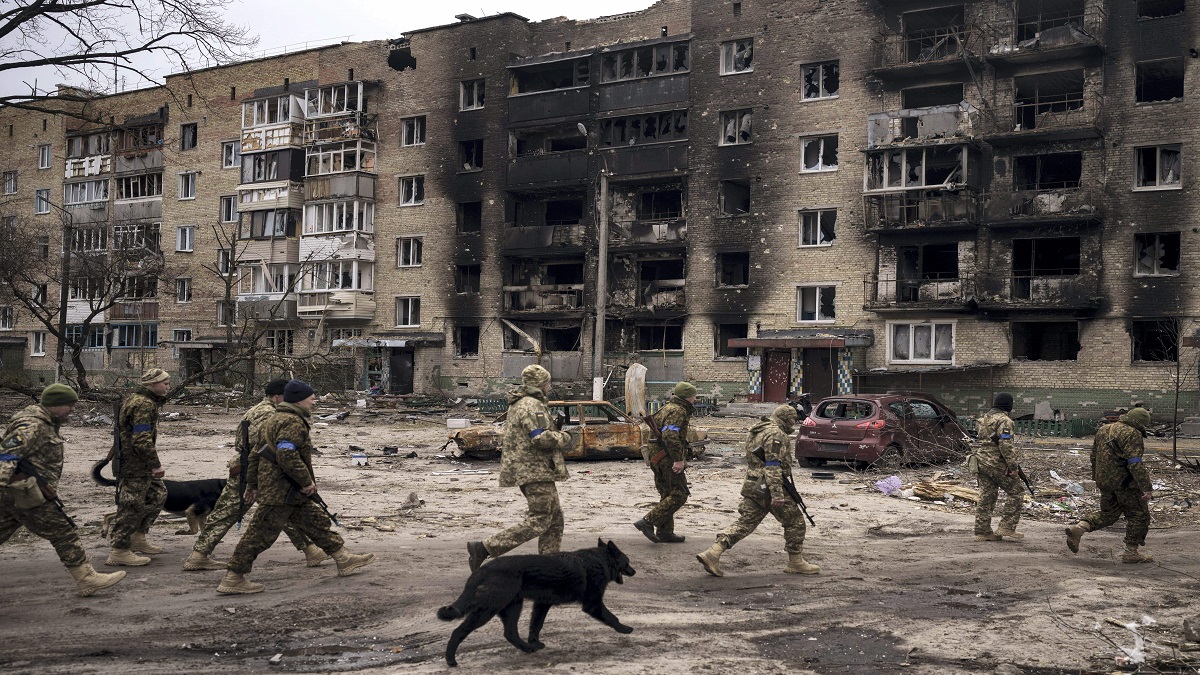 | |||||||
| |||||||
| Belligerents | |||||||
|
Supported by: |
Supported by: | ||||||
| Units involved | |||||||
|
Pro-Russian separatist forces Russian Armed Forces |
Armed Forces of Ukraine National Guard of Ukraine Irregular forces Foreign mercenaries | ||||||
The 2022 Russo-Ukrainian conflict is an ongoing conflict between NATO and the Russian Federation taking place in Ukraine, backed by the imperialist United States. The conflict began with Russian military operations in 24 February 2022 with an incursion on Ukrainian-administered territory.[2] The imperialist US and EU camp is sacrificing Ukraine to 'weaken Russia' according to a former NATO advisor.[3]
In 2014, the US installed a pro-Western government through the Euromaidan coup,[4] which resulted in the rise of neo-Nazism in Ukraine[5][6] and saw pro-NATO Petro Poroshenko elected as President.[7] The most prominent neo-Nazi group in Ukraine is the Azov Battalion, a former paramilitary group that terrorised the Donbass since 2014 and was officially incorporated into the Armed Forces of Ukraine during the conflict. This right-wing pro-West government maintained hostilities towards ethnic Russians in the Donbass region of Ukraine.[8] These hostilities led to separatist movements establishing the Luhansk People's Republic and the Donetsk People's Republic in their corresponding oblasts, which were annexed into the Russian Federation as of 30 September 2022.
Background[edit | edit source]
NATO expansion[edit | edit source]
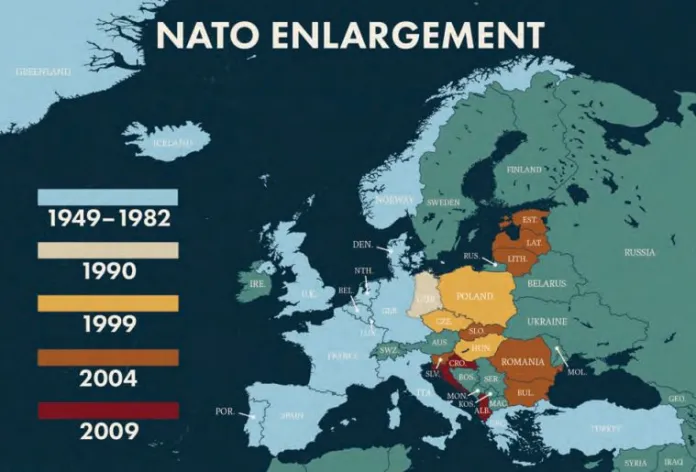
In 1990, in a meeting between United States secretary of state James Baker and Mikhail Gorbachev, the US official guaranteed that "not an inch of NATO’s present military jurisdiction will spread in an eastern direction."[9][10]
Orange Color Revolution[edit | edit source]
See main article: Orange Revolution
Euromaidan coup and Donbass War[edit | edit source]
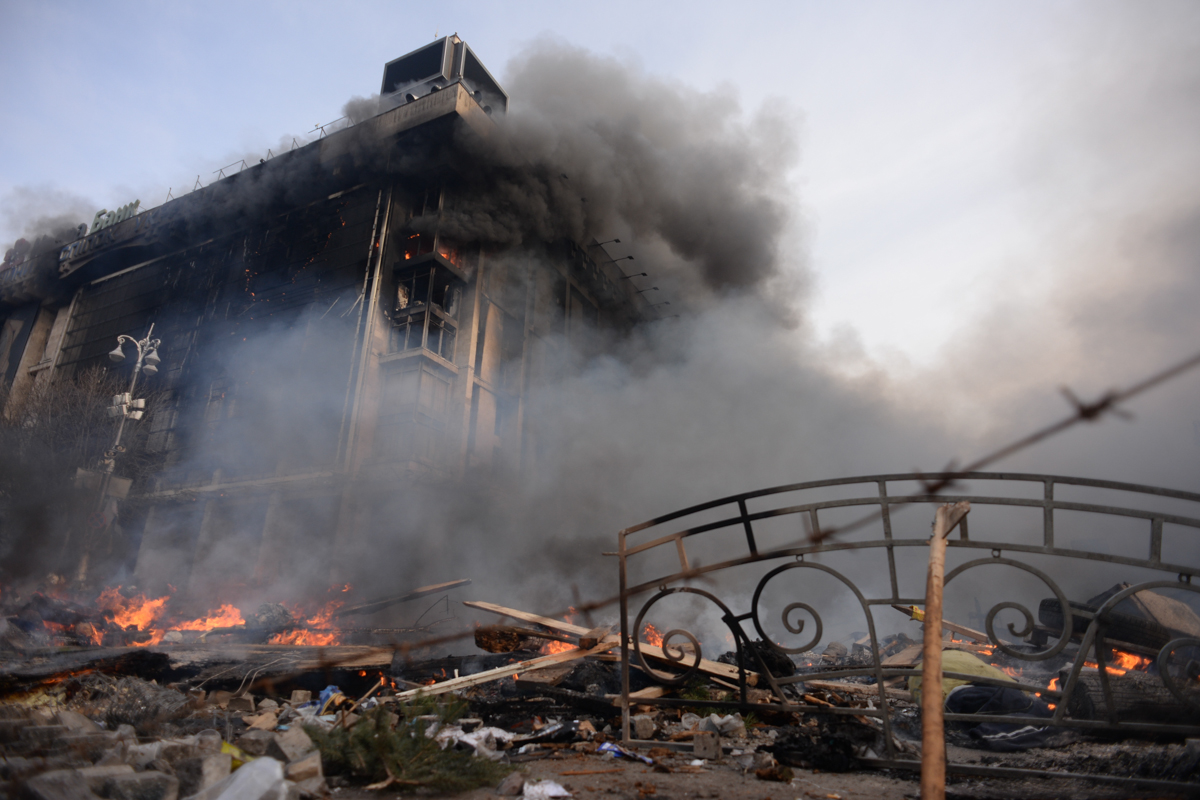
While Russia was distracted with the Sochi Olympics, the US supported the Maidan coup which overthrew recently re-elected anti-NATO president Viktor Yanukovych and replaced him with a far-right, pro-Western government. In response to this coup and with rising tensions from the anti-Russian government, Crimeans (the majority of which were, for historical reasons, ethnic Russians) voted overwhelmingly in favor of seceding from Ukraine and joining into the Russian Federation.[11]
Donetsk and Luhansk also declared independence in their respective oblasts and formed the Donetsk People's Republic and Luhansk People's Republic. These breakaway republics, mostly composed of civilians, were then forced into civil war with the Ukrainian army and para-military neo-Nazi outfits such as the Azov battalion who uses their vast arsenal to shell and invade the oblasts.
Minsk Accords[edit | edit source]
In 2014, Belarus negotiated the first Minsk agreement, which Russia, Ukraine, and the OSCE signed. Germany and France oversaw the negotiations. After the first deal quickly failed, they created a second Minsk agreement in 2015. Minsk II required Ukraine to adopt a new constitution by late 2015 that would decentralize power and give autonomy to Donetsk and Luhansk.
Ukrainian president Petro Poroshenko refused to implement the accords. Zelenskyy promised to restart peace negotiations during his 2019 presidential campaign but reversed his decision after becoming president.[12]
2021 crisis[edit | edit source]
Tensions rose sharply in 2021, when the Brussels summit of the North Atlantic Treaty Organization reiterated that Ukraine would become aligned with NATO,[13] sparking outrage from Russian officials who considered the expansion of NATO a threat of their national security.[14] Russia began to build up troops closer to their borders, demanding that NATO stop its expansion towards Russia.[15]
In December 2021, Russia published two drafted peace treaties, which the West rejected. Russia demanded security guarantees that NATO would not carry out activities on its borders.[12]
Course of the war[edit | edit source]
First phase (February - April 2022)[edit | edit source]
The 2022 conflict began with Russian forces rapidly advancing across Ukraine from the Belarusian border, Crimea, and the Donbass, seizing over a fifth of Ukrainian territory,[16] including the city of Kherson.[17] On March 7, Mikhail and Aleksander Kononovich, members of the Komsomol of Ukraine, were arrested by Ukrainian authorities and imprisoned in Kiev.[18]
Second phase (April - September 2022)[edit | edit source]
Russian forces retreated from northern Ukraine in April 2022.[19] The war then transitioned into attrition, with relatively slow Russian advances taking the cities of Mariupol[20] and Severodonetsk[21] in the spring and summer.
Third phase (September - November 2022)[edit | edit source]
In September 2022, Ukraine launched its first successful counteroffensive which retook all of Russian-occupied Kharkov oblast and a section of Luhansk oblast.[22] Russian forces west of the Dnieper River in Kherson oblast retreated in November 2022.[23]
Fourth phase (November 2022 - May 2024)[edit | edit source]
The winter of 2022 and spring of 2023 saw few territorial changes, as Russia and Ukraine fought a grinding battle of attrition over the city of Bakhmut in Donetsk oblast,[24] and Russia constructed substantial defenses in Zaporozhye oblast during this time in preparation for a Ukrainian attempt to reach Crimea.[25] Russia had consolidated control over Bakhmut by the end of May 2023.[26] At the beginning of June 2023, Ukraine launched its long-awaited counteroffensive against Russian forces in Zaporozhye.[27] As of September 2023, three months after the Ukrainian counteroffensive began, Ukraine has failed to make substantial progress against Russian defences.[28][29][30]
Fifth phase (May - August 2024)[edit | edit source]
On 10 May 2024, Russian forces launched a second offensive towards the Ukrainian-controlled Kharkov oblast.[31] Over 30,00 Russian soldiers are in the front.[32]
Sixth phase (August 2024 - present)[edit | edit source]
On 6 August 2024, Ukraine invaded Russia after launching an incursion in Kursk oblast.[33]
Humanitarian aid[edit | edit source]
During diplomatic talks, Ukraine and Russia have agreed upon humanitarian corridors to allow displaced persons to flee war zones safely.[34]
Foreign involvement[edit | edit source]
Al Qaeda, Hyatt Tahrir al-Sham, and other islamist jihadist groups are joining alongside Ukrainian neo-Nazis to fight against the Russians, similarly to their original task in Operation Cyclone.[1][35]
Germany violated its recent pattern of neutrality by sending weapons to Ukraine.[36]
Casualties[edit | edit source]
According to the Russian Defense Ministry, Ukraine has lost 23 thousand soldiers during the conflict;[37] however, the Ukrainian government claims merely 10 thousand of its solders have been lost during the conflict.[38]
Since the beginning of the conflict, at least 61,207 Ukrainian troops were killed and 49,368 wounded up to 21 September 2022 according to the Russian Ministry of Defense. The number of Russian troops killed amount to 5,397.[39] In addition, over 7 million refugees have fled Ukraine. Of these, over 2.8 million have fled to Russia, which has taken in more refugees than any other country.[40]
Attempted peace deals[edit | edit source]
After negotiating in Istanbul on 29 March 2022, Russia and Ukraine agreed to a negotiated settlement that would have Russia withdraw to its position from 23 February, when it controlled Crimea and the Donbass republics. In exchange, Ukraine would agree not to join NATO and instead receive security guarantees from other countries. British Prime Minister Boris Johnson intervened to sabotage the agreement and continue the war.[41]
Reactions[edit | edit source]
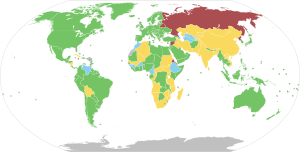
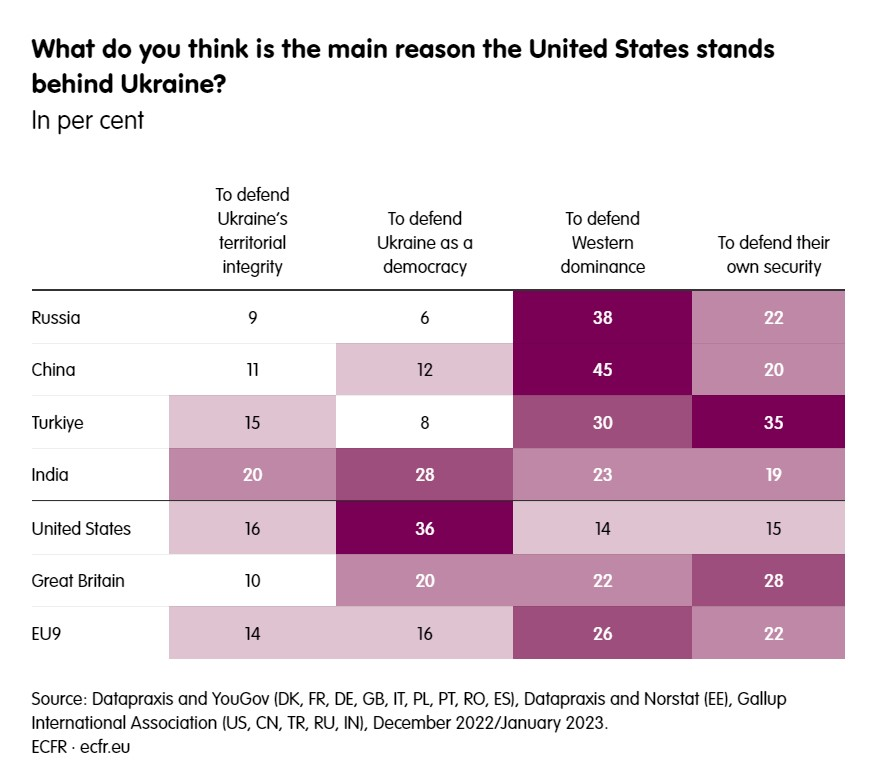
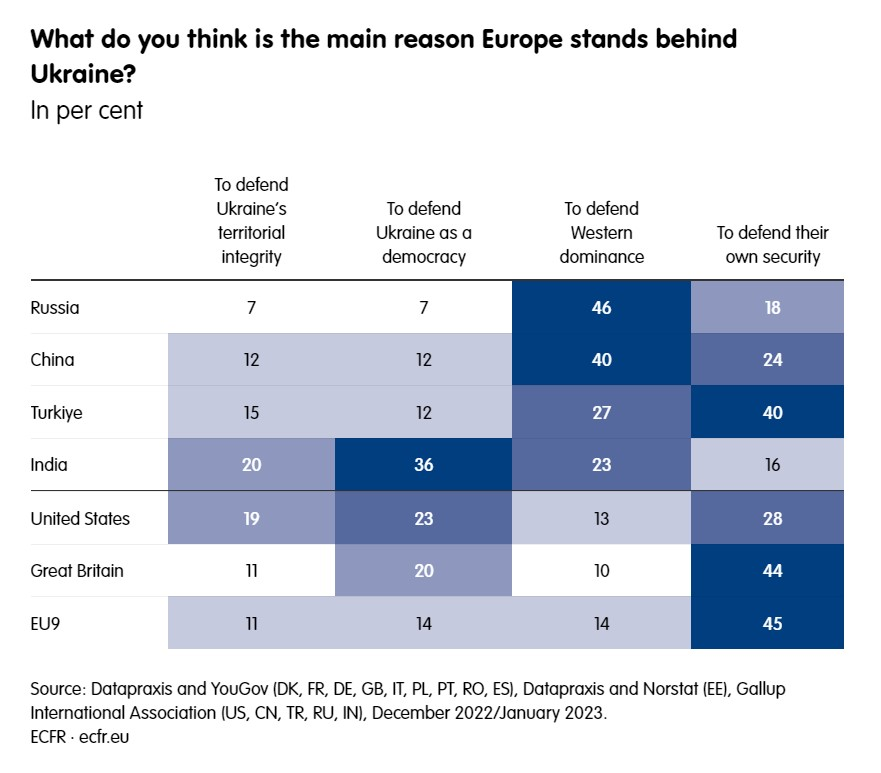
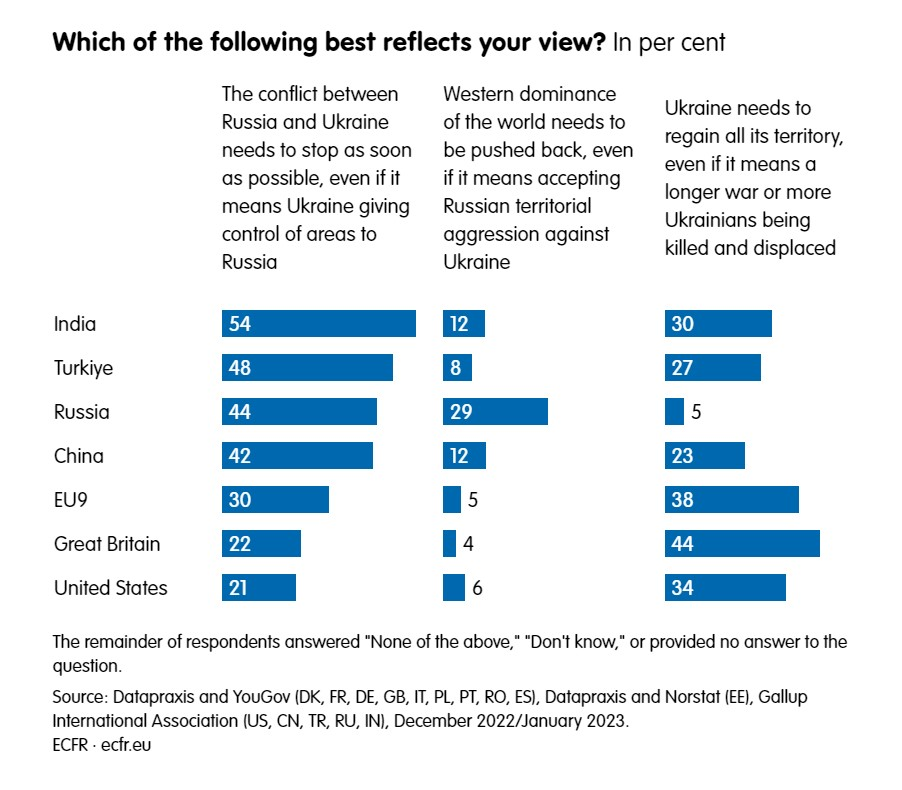
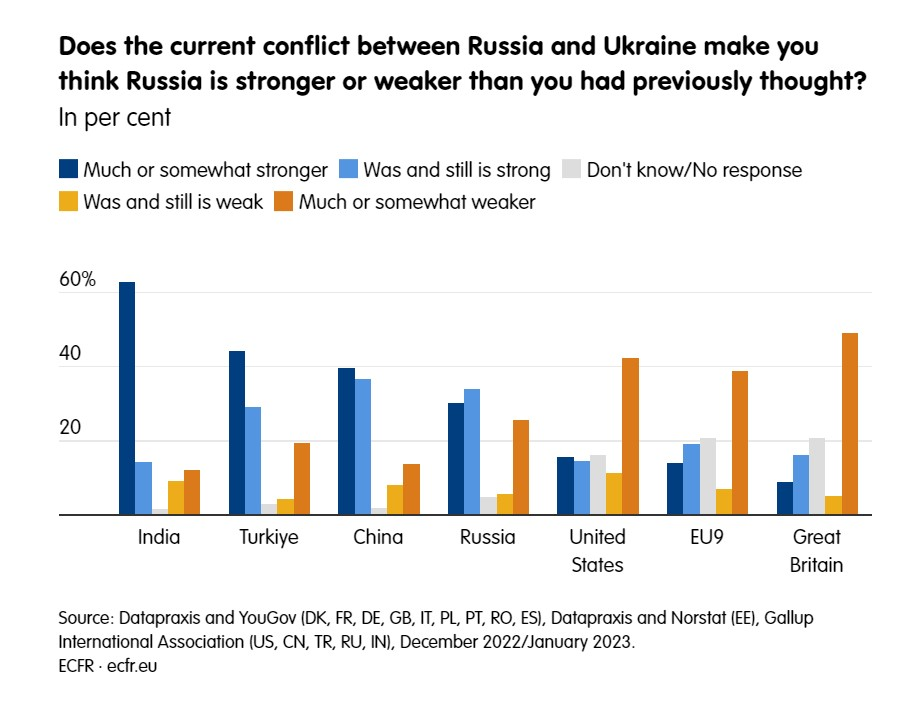
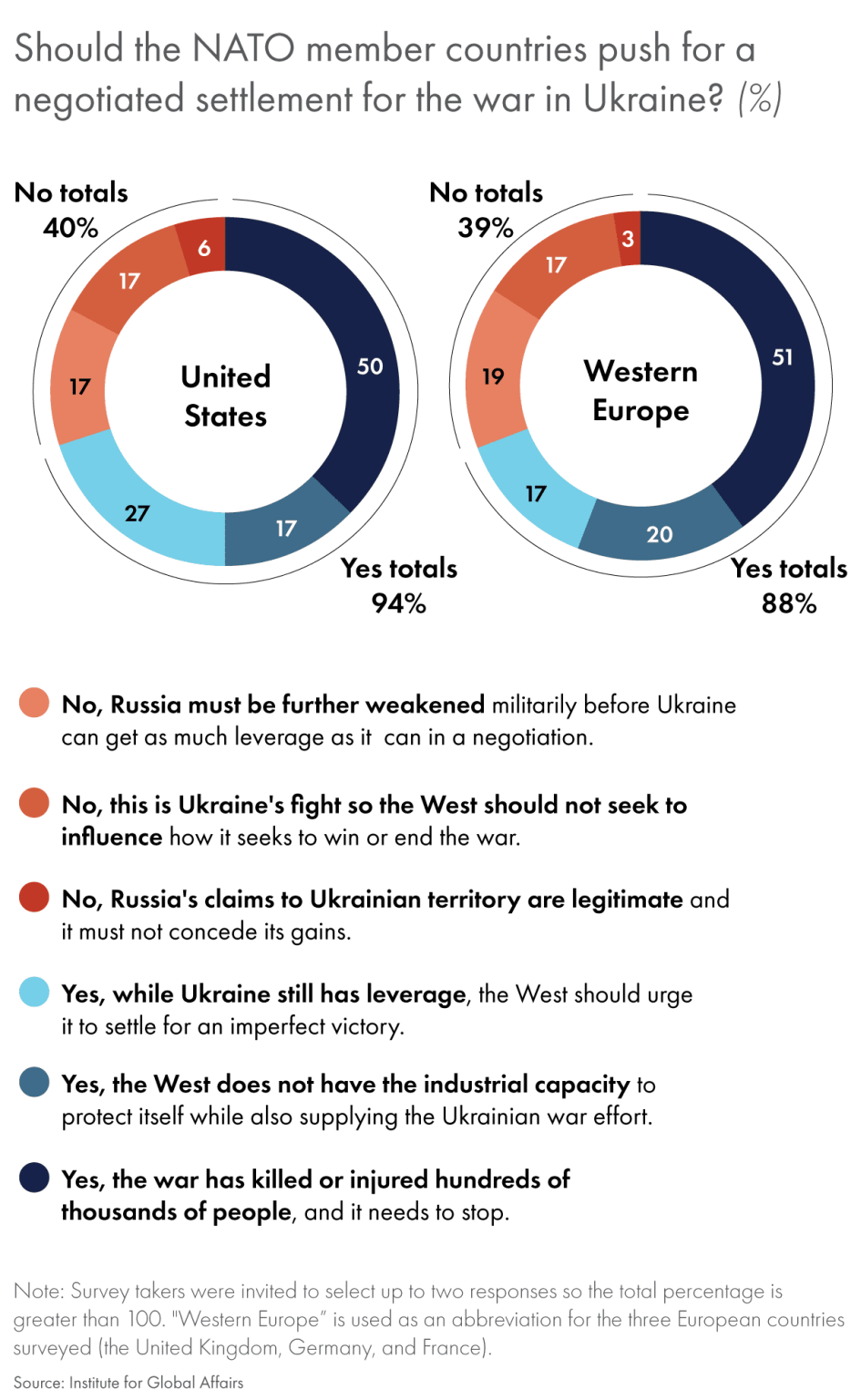
From the West[edit | edit source]
All major imperialist countries, including the United States, United Kingdom, Canada, Japan, and most European Union countries, sanctioned Russia after it began its military operations on February 24,[42] and as a result, Russia became the most sanctioned economy in the world.[43] On March 7th, twenty Russian capitalists were also sanctioned by Japan.[44] The Russian government compiled a list of countries who have taken hostile actions against the country.[45]
The bourgeois media of the United States has been hypocritically feigning support for the citizens of Ukraine while completely disregarding the humanity of those who suffer under the USA's own wars.[46][47]
79% of French people blame the USA and/or NATO for starting the war, and 46% blame Putin or Russia. In Germany, 51% of people blame the USA or NATO and 29% blame Putin or Russia. The French poll allowed people to blame both sides, but the German poll only allowed one choice.[48]
From the Global South[edit | edit source]
Eritrea, Iran, Nicaragua, South Africa, and Venezuela blamed NATO for the war. India, Mexico, Pakistan, and many other Global South countries, including over a dozen countries in Africa, remained neutral. Mahathir Mohamad, the former president of Malaysia, said that the conflict was caused by "Europeans' love of war."[49]
From communist movements[edit | edit source]
Ruling[edit | edit source]
The Communist Party of Cuba released a statement calling for a solution that guarantees security and sovereignty for all, describing NATO's progressive expansion as a military siege.[50]
The Democratic People's Republic of Korea backed Russia's actions in Ukraine and claimed that US provocations and military aggression are entirely to blame for the present situation.[51]
China and Vietnam have both remained neutral while maintaining friendly relations with Russia.[49]
Non-ruling[edit | edit source]
The Communist Party of the Russian Federation has expressed support for Putin's aims to denazify and demilitarize Ukraine, while also calling for the strengthening of local self-government.[52]
The Party for Socialism and Liberation in the United States has made a statement describing how the intervention was the result of NATO provocations against Russia.[53]
The Communist Party of Britain, while opposing NATO expansion, called Russia's military offensive unjustified and demanded a withdrawal of troops. It also pointed out that the unilateral Russian recognition of the DPR and LPR undermines the founding principles of the UN and gives imperialist powers an excuse to abuse such methods against other nations.[54][55] It supported the Stop the War Coalition's call for the withdrawal of Russian troops.[56]
The Socialist Labour Party said the conflict can be resolved quickly, but only with a neutral Ukraine. It criticized the Communist Party of Britain's Morning Star in its recent coverage of Ukraine.[57]
The Communist Party of Great Britain (Marxist–Leninist), on the basis that NATO has been conducting a three decade long slow-motion war against Russia, welcomed Russia's military challenge to NATO. It called denazification the surest way to peace.[58] The party criticized Stop the War's platforming of activists calling for imperialist escalation, as well as its call for a Russian withdrawal.[59] It welcomes Russia's recognition of the DPR and LPR.[58]
The Portuguese Communist Party expressed its deep concern about developments in the situation in Eastern Europe, the current situation and that its recent developments are inseparable from decades of political tension and growing confrontation between the USA and NATO against the Russian Federation, on the military, economic and political planes, in which the continuous enlargement of NATO and the systematic advance of the installation of military assets and contingents of this political-military bloc increasingly closer to the borders of the Russian Federation. Calling for a solution that guarantees security and sovereignty for all, describing NATO's progressive expansion as a provocation.
"The situation in Ukraine cannot but be dissociated from the 2014 coup d'état, promoted by the USA, NATO and the EU, carried out by fascist groups, and which led to the imposition of a xenophobic and warmongering regime, whose violent action is responsible by the worsening of fractures and divisions, by the discrimination and denial of fundamental rights and citizenship of the population, and by the outbreak of war in that country. The PCP reaffirms the need to develop initiatives that contribute to de-escalation and that favor a process of dialogue with a view to a peaceful solution to the conflict, as well as the promotion of peace and security."[60]
Information warfare[edit | edit source]
Censorship[edit | edit source]
In response to the crisis, Western governments and corporations have been actively censoring voices that promote alternative narratives, notably those emerging from Russia or Russia-aligned states. Almost immediately after the start of the special military operation in Ukraine, the European Union banned RT and Sputnik.[61] Reddit has banned links to Russian media.[62] The previously uncensored search engine DuckDuckGo began censoring Russian news outlets because of the war.[63]
Wikipedia has also become a major disinformation website, denying the genocide of Russians in Donbass as well as spreading other misinformation. Wikipedia also praises the NAFO neo-Nazi space[3] and presents the information warfare in an extremely biased way.[2]
In an effort to help netizens circumvent Western propaganda about the situation, ProleWiki has collected information about alternative social media sites.
Propaganda[edit | edit source]
The US government has been briefing TikTok influencers to promote the NATO/US narrative.[64][65]
References[edit | edit source]
- ↑ 1.0 1.1 1.2 "450 Arab and foreign extremists from Idlib arrive in Ukraine" (2022-03-08).
- ↑ 2.0 2.1 "Russia invades Ukraine: Political, military leaders' reactions" (2022-02-24). Reuters. Retrieved 2022-03-10.
- ↑ 3.0 3.1 Aaron Mate (2022-04-15). "US, EU sacrificing Ukraine to ‘weaken Russia’: fmr. NATO adviser" The Grayzone.
- ↑ "How and Why the US Government Perpetrated the 2014 Coup in Ukraine".
- ↑ "Commentary: Ukraine’s neo-Nazi problem" (2018-03-19).
- ↑ “Our government encourages glorification of Nazi collaborators, mass-murderers, and murderers of Jews. Literally, there are hundreds of monuments, streets, named after killers of Jews. [...] We have anti-Semitic incidents every day. There is vandalism of mass graves - Holocaust mass graves. Vandalism on Jewish monuments. Sholem Aleichem latest - was vandalised with swastikas in Kiev, central Kiev.”
"Ukrainian Jewish Committee: Our government encourages the glorification of Nazi collaborators" (2022-03-14). Archived from the original on 2022-03-23. - ↑ "Petro Poroshenko wins Ukraine presidency, according to exit polls" (2014-05-25). The Guardian.
- ↑ "Ethnic Russians in eastern Ukraine say attacked by govt. forces" (2022-02-17).
- ↑ Svetlana Savranskaya & Tom Blanton (2017-12-12). "NATO expansion: what Gorbachev heard" National Security Archive.
- ↑ “Baker: We understand the need for assurances to the countries in the East. If we maintain a presence in Germany that is part of NATO, there would be no extension of NATO's jurisdiction for forces of NATO one inch to the east.”
James Baker, Mikhail Gorbachyov (1990). Memorandum of conversation between Mikhail Gorbachev and James Baker in Moscow (p. 6). [PDF] National Security Archive. - ↑ "Crimeans vote overwhelmingly to secede from Ukraine, join Russia".
- ↑ 12.0 12.1 Ben Norton (2023-02-10). "Ukraine’s Zelensky admits he sabotaged Minsk peace deal with Russia, West blocked negotiations" Geopolitical Economy Report. Archived from the original on 2023-09-25.
- ↑ “We reiterate the decision made at the 2008 Bucharest Summit that Ukraine will become a member of the Alliance with the Membership Action Plan (MAP) as an integral part of the process; we reaffirm all elements of that decision, as well as subsequent decisions, including that each partner will be judged on its own merits.”
"Brussels Summit Communiqué" (2021-04-14). NATO. - ↑ “"After the collapse of the USSR, the security situation in Europe deteriorated sharply. Five ‘waves’ of NATO expansion have brought the Alliance States forces closer to our borders," [the Russian ambassador to the United States Anatoly Antonov] stated.
"NATO is constantly building up its offensive potential, demonstrating military force along the perimeter of the Russian territory. [...]”
"NATO expansion one of main threats to Russia’s national security - ambassador" (2022-01-16). Russian News Agency TASS. Retrieved 2022-01-24. - ↑ "West promised not to expand NATO" (2022-02-18). RT.
- ↑ "Russia Controls About 20% of Ukrainian Territory: Zelensky" (2022-06-02). TeleSUR. Archived from the original on 2023-09-14. Retrieved 2023-09-14.
- ↑ "Russia says it captures Ukrainian city of Kherson -RIA" (2022-03-02). Reuters. Archived from the original on 2022-03-02. Retrieved 2023-09-14.
- ↑ "Ukraine: Communist Youth Union members beaten badly, remain detained in Kiev" (2022-03-13). In Defense of Communism. Archived from the original on 2022-03-13. Retrieved 2022-03-20.
- ↑ The New Atlas (2022-04-04). "Russian Operations in Ukraine: Week 6 Update". YouTube.
- ↑ "Peaceful Life Returning to Mariupol — City Head" (2022-05-21). TeleSUR. Archived from the original on 2023-09-14. Retrieved 2023-09-14.
- ↑ "Russia Confirms Full Control of Severodonetsk City" (2022-06-25). TeleSUR. Archived from the original on 2023-09-14. Retrieved 2023-09-14.
- ↑ The New Atlas (2022-09-14). "Escalate or Grind On? Russian Ops in Ukraine Update for September 14, 2022". YouTube.
- ↑ The New Atlas (2022-10-09). "Russian Kherson Withdrawal: Trap? Or Necessary Chess Move?". YouTube.
- ↑ "Why Russia and Ukraine have fought for five months over Bakhmut" (2022-12-22). CGTN. Archived from the original on 2023-09-14. Retrieved 2023-09-14.
- ↑ Gerry Doyle, Vijdan Mohammad Kawoosa and Adolfo Arranz (2023-04-24). "Digging in: How Russia has heavily fortified swathes of Ukraine – a development that could complicate a spring counteroffensive." Reuters. Archived from the original on 2023-05-01. Retrieved 2023-09-14.
- ↑ "Russia claims 'full' control of Bakhmut while Ukraine says situation 'critical'" (2023-05-21). CGTN. Archived from the original on 2023-09-14. Retrieved 2023-09-14.
- ↑ Guy Faulconbridge (2023-06-05). "Russia says it thwarted major Ukrainian offensive, Kyiv says Moscow spreads lies" Reuters. Archived from the original on 2023-06-05. Retrieved 2023-09-14.
- ↑ "Ukraine tells counter-offensive critics to 'shut up', Russia 'sinking ships' to block Crimea bridge attacks" (2023-09-01). CGTN. Archived from the original on 2023-09-14. Retrieved 2023-09-14.
- ↑ "Ukraine Has Lost 71,500 Soldiers in Counteroffensive: Putin" (2023-09-12). TeleSUR. Archived from the original on 2023-09-14. Retrieved 2023-09-14.
- ↑ Lou Robinson, Sophie Tanno, Tim Lister and Byron Manley (2023-09-08). "Seeking a breakthrough: A visual guide to Ukraine’s counteroffensive" CNN. Archived from the original on 2023-09-08. Retrieved 2023-09-14.
- ↑ "В СНБО прокомментировали ситуацию на Харьковщине и оценили угрозу для областного центра" (May 10, 2024). Телеграф. Archived from the original on 2024-05-16.
- ↑ "Security council secretary: Over 30,000 Russian troops involved in attack on Kharkiv Oblast". Kyiv Independent. Archived from the original on 14 May 2024.
- ↑ "Moscow claims Ukraine has launched offensive inside Russia" (6 August 2024). Financial Times. Archived from the original on 7 August 2024.
- ↑ "Ukraine says talks with Russia agreed on humanitarian corridors". Reuters.
- ↑ "Al Qaeda Fighters Join Ukraine" (2022-03-13).
- ↑ Richard Medhurst (2022-03-02). "Germany Sends Weapons to Ukraine, Breaks with Neutrality" Rokfin.
- ↑ "Russian Defense Ministry to publish data on military deaths from Ukrainian documents" (2022-4-16). RUSSIAN NEWS AGENCY.
- ↑ Claire Heald (2022-6-11). "10,000 Ukrainian soldiers killed, Kyiv says" BBC.
- ↑ “"Initially, the Armed Forces of Ukraine amounted to between 201,000 and 202,000 people, and since then they have suffered losses of around 100,000, with 61,207 killed and 49,368 others wounded," [Minister of Defense Sergei Shoigu] said.”
"Russia reveals military losses in Ukraine" (2022-09-21). RT. Retrieved 2022-09-22. - ↑ "Ukraine Refugee Situation" (2022-11-17). UN Refugee Agency. Archived from the original on 2022-11-17. Retrieved 2022-11-17.
- ↑ Ben Norton (2022-09-23). "West killed peace proposal to end Ukraine war, Russia supported negotiated settlement" Geopolitical Economy Report. Archived from the original on 2023-02-06.
- ↑ Al Jazeera Staff (2022-03-03). "List of sanctions against Russia after it invaded Ukraine" Al Jazeera. Retrieved 2022-03-08.
- ↑ Nick Wadhams (2022-03-07). "Russia is now the world's most-sanctioned nation" Retrieved 2022-03-09.
- ↑ "Japan sanctions 20 more Russian businessmen, officials — MFA" (2022-03-07). Russian News Agency TASS. Retrieved 2022-03-10.
- ↑ "Russian government approves list of unfriendly countries and territories" (2022-03-07). Russian News Agency TASS.
- ↑ Richard Medhurst. "Hypocrisy of the West Is Unbelievable" | Richard Medhurst on Ukraine"
- ↑ Daniel McAdams (2022-02-25). "Washington's Crocodile Tears Over Ukraine's Destruction" Ron Paul Institute.
- ↑ Ben Norton (2023-08-21). "USA & NATO responsible for Ukraine war, German & French public say in poll" Geopolitical Economy Report. Archived from the original on 2023-09-08.
- ↑ 49.0 49.1 Ben Norton (2022-03-28). "Many Global South countries blame US/NATO for Ukraine war, not Russia" Geopolitical Economy Report. Archived from the original on 2023-03-06. Retrieved 2023-04-02.
- ↑ "“Cuba advocates a solution that guarantees the security and sovereignty of all”" (2022-02-28). Granma. Archived from the original on 2022-02-28.
- ↑ "The U.S. Should Not Shake International Peace and Stability at the Basis" (2022-02-26). Archived from the original on 2022-02-27.
- ↑ "The Response to External Pressure Must Be a Radical Change of International Policy" (2022-03-02). Archived from the original on 2022-03-02.
- ↑ Party for Socialism and Liberation (2022-02-24). "PSL Statement on Russia’s Military Intervention in Ukraine" Liberation News.
- ↑ "Stop the war - start the peace". Morning Star. Archived from the original on 2022-02-28.
- ↑ "For peace and a just solution to the conflict in Ukraine". Archived from the original on 2022-03-01.
- ↑ "Yes, Russia should pull out — but Nato's warlike manoeuvres must end too". Morning Star. Archived from the original on 2022-02-22.
- ↑ Arthur Scargill. "Scargill's reply to the Morning Star" Archived from the original on 2022-03-07.
- ↑ 58.0 58.1 "Kiev junta facing defeat as Russia roots out fascist militias from Ukraine" (2022-03-01). Proletarian. Archived from the original on 2022-03-01.
- ↑ "Renegacy of Stop the War on display once again at ‘antiwar’ events" (2022-03-08). Proletarian. Archived from the original on 2022-03-08.
- ↑ PCP (2022-02-22). "Sobre os recentes desenvolvimentos no Leste da Europa" pcp.pt.
- ↑ Patrick Wintour, Jennifer Rankin and Kate Connolly (2022-02-27). [https://www.theguardian.com/media/2022/feb/27/eu-ban-russian-state-backed-channels-rt-sputnik "This article is more than 2 years old EU to ban Russian state-backed channels RT and Sputnik"] The Guardian. Retrieved 2024-03-24.
- ↑ Todd Spangler (2022-03-03). "Reddit Bans Links to Russian State Media Across Entire Site" Variety.
- ↑ "Alternative Search Engine DuckDuckGo Will Censor Sites ‘Associated With Russian Disinformation’". Vision Times.
- ↑ Sara Cook (2022-03-11). "White House briefs social media influencers on Ukraine crisis" CBS News.
- ↑ Richard Medhurst (2022-03-12). "CRINGE! White House Hires TikTokers to Spread Anti-Russian Propaganda"
